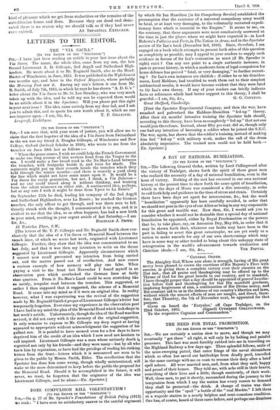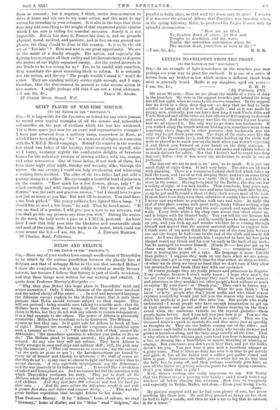THE NEED FOR TOTAL PROHIBITION,
[TO TER EDITOR or sag " EincrATOR."1 Sra,—We are certainly a nation slow to move, and though we may eventually "get there" all right, it will only be by balling and painful processes. This fact was most forcibly rubbed into me in travelling on the Highland Railway a few days ago. Three splendid fellows, units of the mine-sweeping patrol, that outer fringe of the naval skirmishers which so often has saved our battleships from deadly peril, travelled in the same carriage with me en route to resume their duty after a brief spell ashore. All were married men, and, from what they said, happy and proud of their homes. They told me, with ache still in their hearts, something of their lives and a little, though cautiously, of their work. Well, these men, to put it shortly, succumbed during the journey to the temptation from which I say the nation has every reason to demand they shall be protected—the drink. A change of trains was their opportunity and the " spoil " a bottle of the "real Mackie." I left them at a wayside station in a nearly helpless and semi-comatose condition. One has, of course, heard of these eases before, and perhaps one dismisses
them as unusual ; but it requires, I think, ocular demonstration to drive it home and stir one to try Borne action, and this must be my excuse for intruding in your columns. It is also in the hops that these lines may add something to the weight of that suppressed public opinion which I am sure is calling for remedial measures. Surely it is not impossible. Russia has done it, France has done it, and on grounds physical, moral, medical, and patriotic, and in fact on any ground one pleases, the thing should be done in this country. Is it to be the old cry of "Too late " ? Here and now is our great opportunity. We are in the midst of a deadly struggle. The nation, and especially the fighting forces, require all their virility and intellectual clarity to disperse the powers of our highly organized enemy. Are the vested interests in the Trade to be too strong for us ? For, to be candid with ourselves, they constitute the great stumbling-block to reform. It is certainly not the nation, and the cry "The people wouldn't stand it" won't do either. They are standing military service right enough, and I urge, therefore, that the Government be pressed to take serious action in this matter. I might perhaps add that I am not a total abstainer.
—I am, Sir, &c., PERCY H. ADAMS. 32 Craven Street, Strand, W.C.



































 Previous page
Previous page